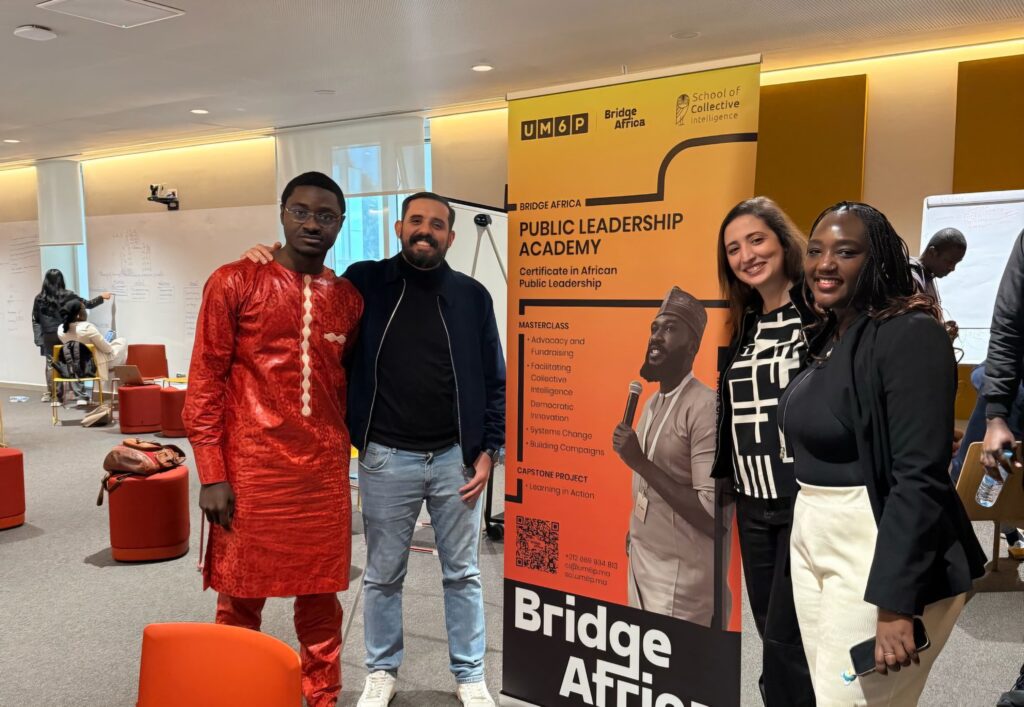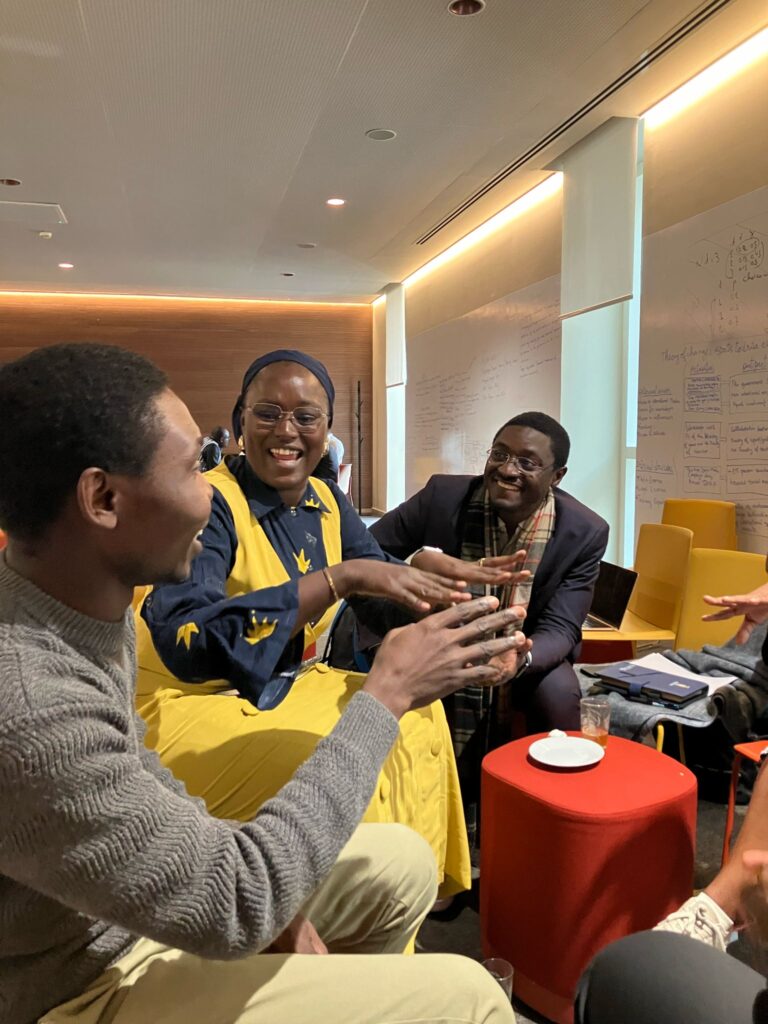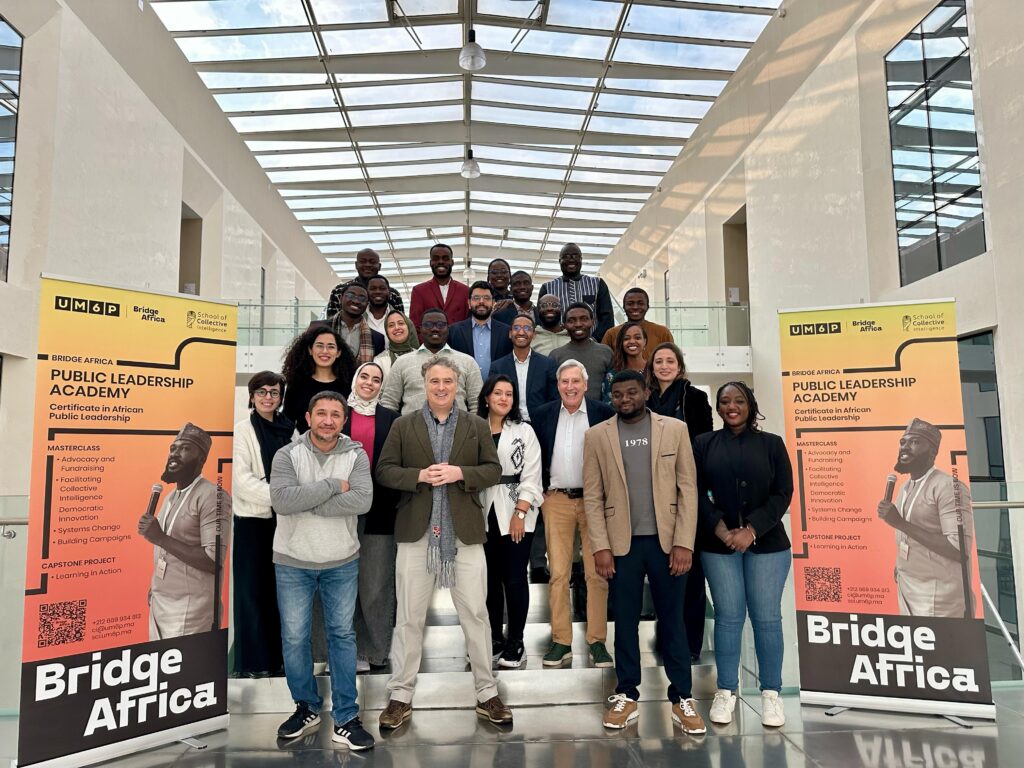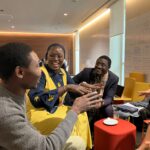I am currently involved in the African Public Leadership Academy (APLA) — a training program that was initiated by Bridge Africa to provide young changemakers with the tools to shape the future. The topics we cover are numerous, including public narrative, theory of change, advocacy and fundraising, democratic innovation, campaign building, system change, and others.
This experience has made me reflect on a question that has followed me for years:
Are leaders born, or do we learn to become one?
The Myth of a Natural-Born Leader
Sometimes, when we observe public figures like Barack Obama, Ellen Johnson Sirleaf, or Nelson Mandela on public platforms, their leadership abilities look very organic, like they were born to do it. The way they talk, make choices, present themselves, everything seems like just very capable, efficient, and committed « to lead » the ones who are no less than the destiny chosen. But it is the learnings of history and the findings from studies that clarify the matter. In a well-liked investigation, Center for Creative Leadership (CCL) informed that only 24% of the capability to lead is the gift of nature, while the rest of the 76% can be developed by means of experience, learning, and training¹. The authors of this analysis arrived at the conclusion that the ought to be most times a thing that we fashion, rather than the endowment innate in us.
My First Steps as a Leader
My personal journey is a testimony to that belief. In 2008, I had the unique opportunity to join the Young Leaders Club in my high school, les Sapins college— an initiative by the International Leadership Foundation in Cameroon. That was the very first time I came across the concept of leadership.
Our tasks were humble at first — cleaning toilets, helping organize school events, supporting other students. But behind each of these tasks was a lesson: leadership is not about titles, but about responsibility and service.
It was also the first time I was asked to speak in public — a terrifying but empowering moment. I still remember trembling as I stood in front of my peers. That experience taught me something fundamental: confidence is not a prerequisite for leadership, it’s a result of action repeated over time.
Leadership as a Set of Learnable Skills
Over the years, I’ve come to realize that leadership is a craft — a combination of learned skills, practiced reflection, and emotional resilience. Great leaders aren’t just charismatic or intelligent. They are excellent communicators, empathetic listeners, strategic thinkers, and above all, they’re self-aware. Similarly, in the APLA program, we spend time building our “public narrative” — learning how to tell stories that inspire and mobilize. This is based on the work of Harvard Professor Marshall Ganz, who has trained thousands of community organizers worldwide. He teaches that storytelling is not a gift you are born with, but a leadership practice you can learn.²
Charisma Is Nice, But It’s Not Everything
Sure, some people are naturally more outgoing, more magnetic. But charisma alone doesn’t make a leader. It’s a nice to have, not a need to have.
Angela Merkel, who led Germany for 16 years, wasn’t known for her charisma. What made her an effective leader was her ability to listen, stay calm under pressure, and make calculated decisions. She led with credibility, not charm — and became one of the most respected leaders of her time.
I used to think leadership meant having something “special” inside — a hidden power only a few were born with. But now I believe the “special” thing is the willingness to grow.
My Commitment to Growth
That’s why I continuously put myself in spaces that challenge me to grow. Whether it’s public speaking, participating in debates, leading workshops, or joining learning communities — I seek opportunities to sharpen my leadership toolkit.
I believe in the power of intentional learning. We don’t become leaders overnight. We become leaders through consistent effort, reflection, failure, and trying again.
And if I can leave you with one thought, it would be this:
Leadership isn’t a destiny — it’s a decision.
Sources:
- Avolio, B. J., & Luthans, F. (2006). The High Impact Leader: Moments Matter in Accelerating Authentic Leadership Development. McGraw-Hill.
- Ganz, M. (2009). What is Public Narrative? Harvard Kennedy School. Retrieved from Marshall Ganz – Public Narrative
- Center for Creative Leadership. (2020). Are Leaders Born or Made? CCL Research










jTWVIQIBTRRMAdjUpcOSzvTw 2025-11-03
klRlGqIuXJTZHltEAxMLO
* * * $3,222 deposit available! Confirm your transaction here: http://uwiapartment.com/index.php?rvljbv * * * hs=d32f3fcff28c0f4b8080b73448b10256* ххх* 2025-11-05
7e8v71
nfHAWLNUSRyijdxHOvRtmim 2025-11-14
JeZosbmoCqLgHzIP
TaKfyZtwwkmXhxGtnhagoqCX 2025-11-14
JbuTrPhJzRQTmoWeokWBYOh
QZEKyPTplyCDbojPrUR 2025-11-15
RKCAzgxUbkjeeTuS
Carloswrors 2025-12-05
We buy household appliances in St. Petersburg and the Leningrad Region Скупка техники. We buy tumble dryers.
Lanceeping 2025-12-06
Here’s
a lightweight
301 test link
for testing how different browsers and servers handle 301 responses
.
It’s just for verifying how redirects behave in different conditions.
If you’re testing redirects as well, this may help
:
https://lnkshk.com/ndDEko
bk888slot 2025-12-08
BK888slot, another slots site. Gotta be careful with these. Always read the terms and conditions and don’t gamble more than you can afford. Good luck if you give it a shot: bk888slot
cz777gamelogin 2025-12-23
Alright, listen up! cz777gamelogin? That’s where it’s at. Easy login, quick games. What more could you want? Give it a shot cz777gamelogin
Amanda Rios 2026-01-01
Wow, this paragraph is fastidious, my sister is analyzing these kinds of things, therefore I am going to let know her.
unlocker 2026-01-09
unlocker.ai – The Ultimate AI Tool for Bypassing Restrictions and Unlocking Content Seamlessly!
Anya151Sn 2026-01-12
Hello everyone!
I came across a 151 valuable website that I think you should dive into.
This resource is packed with a lot of useful information that you might find insightful.
It has everything you could possibly need, so be sure to give it a visit!
https://egerhirek.hu/2025/01/06/mobil-alkalmazasok-amelyek-megkonnyithetik-az-eletedet/minden-mas
And do not forget, folks, which a person always may inside the piece locate solutions to your the absolute tangled inquiries. Our team attempted to explain the complete data using an most understandable way.
cracked windshield repair rock hill sc 2026-01-12
Comment 83: This blog post is truly outstanding and provides such a
windshield replacement near me rock hill sc 2026-01-13
Your talent is showing BIG TIME — wow!
77jili 2026-01-13
77jili https://www.77jilig.net
insurance auto glass rock hill sc 2026-01-13
This lit a fire in me — THANK YOU for this energy!
ph789 login 2026-01-13
ph789 login https://www.ph789-login.com
pesomaxfun 2026-01-14
pesomaxfun https://www.elpesomaxfun.com
okebet4 2026-01-14
okebet4 https://www.okebet4u.com
peso99 2026-01-14
peso99 https://www.repeso99.net
fb777 slot 2026-01-14
fb777 slot https://www.fb7777-slot.com
nustaronline 2026-01-14
nustaronline https://www.umnustaronline.org
okebet168 2026-01-14
okebet168 https://www.okebet168u.org
philucky 2026-01-14
philucky https://www.usphilucky.org
phwin25 2026-01-14
phwin25 https://www.phwin25g.net
93jili 2026-01-14
93jili https://www.la93jili.net
98jili 2026-01-14
98jili https://www.98jilig.com
bet777app 2026-01-14
bet777app https://www.bet777appv.org
gkbet 2026-01-14
gkbet https://www.gkbeth.org
jililuck 22 2026-01-14
jililuck 22 https://www.jililuck-22.com
peryaplus 2026-01-14
peryaplus https://www.rsperyaplus.net
777phl casino 2026-01-14
777phl casino https://www.777phl.org
9apisologin 2026-01-14
9apisologin https://www.it9apisologin.com
tongits go 2026-01-14
tongits go https://www.yatongits-go.net
jilivip 2026-01-14
jilivip https://www.jilivipu.net
jl10 casino 2026-01-14
jl10 casino https://www.jl10-casino.net
tayabet 2026-01-14
tayabet https://www.yetayabet.net
phtaya11 2026-01-14
phtaya11 https://www.phtaya11y.com
fb777login 2026-01-14
fb777login https://www.fb777loginv.org
tg77com 2026-01-14
tg77com https://www.tg77com.org
phtaya06 2026-01-14
phtaya06 https://www.phtaya06y.com
playpal77 2026-01-14
playpal77 https://www.playpal77sy.org
ph22login 2026-01-14
ph22login https://www.ph22login.org
tayawin 2026-01-14
tayawin https://www.tayawinch.net
philbet 2026-01-14
philbet https://www.philbetts.net
phtaya10 2026-01-14
phtaya10 https://www.phtaya10y.com
99boncasino 2026-01-14
99boncasino https://www.99boncasino.net
okebet3 2026-01-14
okebet3 https://www.okebet3u.org
nustar online 2026-01-14
nustar online https://www.etnustar-online.com
phl789 2026-01-14
phl789 https://www.nphl789.net
jilibet004 2026-01-14
jilibet004 https://www.jilibet004.org
91phcom 2026-01-14
91phcom https://www.91phcom.net
mwplay88fun 2026-01-14
mwplay88fun https://www.mwplay88fun.org
vipjili 2026-01-14
vipjili https://www.vipjiliji.com
fg777link 2026-01-14
fg777link https://www.befg777link.com
phtaya01 2026-01-14
phtaya01 https://www.phtaya01.org
2jili 2026-01-14
2jili https://www.2jili.org
okbet15 2026-01-14
okbet15 https://www.okbet15.org
insurance windshield replacement rock hill sc 2026-01-14
Your content always brings fresh insight.
pagcor 2026-01-14
pagcor https://www.ngpagcor.net
2222ph 2026-01-14
2222ph https://www.be2222ph.org
balato88 2026-01-14
balato88 https://www.balato88u.com
pin77 app 2026-01-14
pin77 app https://www.pin77.tech
taya333 2026-01-14
taya333 https://www.taya333.org
pin77 casino 2026-01-14
pin77 casino https://www.pin77-ol.com
pin77 online 2026-01-14
pin77 online https://www.pin77-online.com
jl16login 2026-01-14
jl16login https://www.adjl16login.net
jiliokcc 2026-01-14
jiliokcc https://www.jiliokccw.com
taya777login 2026-01-14
taya777login https://www.wtaya777login.com
bk8casino 2026-01-14
bk8casino https://www.bk8casinovs.com
phtaya1 2026-01-14
phtaya1 https://www.phtaya1.org
a45com 2026-01-14
a45com https://www.a45com.org
slotphlogin 2026-01-14
slotphlogin https://www.exslotphlogin.net
phtaya 63 2026-01-14
phtaya 63 https://www.phtaya-63.org
auto glass repair rock hill sc 2026-01-14
point resonated strongly and was presented beautifully. It is remarkable
windshield repair near 27332 2026-01-15
finish because the clarity, structure, and passion in your writing
cheap windshield replacement Charlotte NC 2026-01-15
point resonated strongly and was presented beautifully. It is remarkable
auto glass repair Charlotte NC reviews 2026-01-15
This was overflowing with positivity and energy — loved it!
aftermarket windshield replacement rock hill sc 2026-01-16
I’ll definitely be reading more from you.
locksmithsAnith 2026-01-16
Hello.
Awesome forum! Looking for locksmith advice.
Good luck:)
i88casino 2026-01-19
I gave i88casino a whirl the other night. Not gonna lie, some of the graphics were pretty slick. Payouts were decent too. Take a look: i88casino.
lottusbet 2026-01-19
Heard some whispers about Lottusbet, so I checked it out. Lottery fans, this might be up your alley. Not my thing personally, but the interface is clean. Check it out yourself: lottusbet.
pt888slot 2026-01-19
PT888slot is where it’s at! Got some great wins here, the slots are on point and the website is decent so give it a shot pt888slot!
phgaming 2026-01-19
phgaming https://www.rephgaming.net
tp777 2026-01-19
tp777 https://www.betp777.org
iwinfortune 2026-01-21
With a name like iwinfortune, how can I not be curious? Fortune is what I’m hoping for. Let someone get my fortune at the iwinfortune.
sv388borneo303 2026-01-21
Sv388borneo303, now that’s a mouthful! Sounds a bit more exotic. Let’s have a gander and see what they’re offerin’. sv388borneo303
sv388juraganslotlogin 2026-01-21
Yo, just checked out sv388juraganslotlogin! Seems like a decent spot. Anyone else had any luck there? Worth a shot, right? Check it out yourself: sv388juraganslotlogin
Zenobia Roques 2026-01-22
refreshing depth of insight. I found myself fully engaged from start to
Marisol Sobeck 2026-01-22
stands out.
auto glass replacement charlotte nc windshield replacement weekend 2026-01-23
point resonated strongly and was presented beautifully. It is remarkable
auto glass replacement charlotte nc auto glass replacement near cotswold 2026-01-24
Comment 297: This blog post is truly outstanding and provides such a
vph777 2026-01-25
vph777 https://www.rvph777.org
plus777 2026-01-25
plus777 https://www.doplus777.org
55jili 2026-01-25
55jili https://www.it55jili.net
684casino 2026-01-25
684casino https://www.lists684casino.com
5jili 2026-01-26
5jili: Best Online Slot & Casino Philippines. Fast 5jili Login, Register & App Download. Join 5jili, the best online slot & casino in the Philippines. Experience fast 5jili login, easy 5jili register, and secure 5jili app download for top games today. visit: 5jili
acewin888 2026-01-26
acewin888 download|acewin888 register|acewin888 app|acewin888 slots|acewin888 login Experience the ultimate online gaming at acewin888, the premier casino platform in the Philippines. Secure your acewin888 login to enjoy high-win acewin888 slots, or download the acewin888 app for seamless mobile access. Register at acewin888 today to start your winning journey with top-tier rewards and secure payouts! visit: acewin888
mr88vn 2026-01-28
Yo, heard good things about mr88vn! Thinking of checking it out this weekend. Anyone got any insider tips? Sounds like a fun place to potentially win big! mr88vn
hd88bet 2026-01-28
Been hearing whispers about hd88bet. Anyone got some real-world experience with them? Fair play and decent payouts are key! hd88bet
hitclubforum 2026-01-28
Just stumbled upon hitclubforum.net, looks like a place to share tips and strategies for Hit Club. Anyone active in there? Give us a shout! hitclubforum
hitclubweb 2026-01-30
Hey guys, checked out hitclubweb the other day. It’s pretty slick! Found some cool stuff I hadn’t seen before. Worth a look! Check out hitclubweb for yourself!
matbet tv canlı maç izle 2026-01-30
Okay listen up. This is the best way to watch games. Matbet TV is where its at! Stream the matches straight to your screen go to matbet tv canlı maç izle.
blu phim 2026-01-30
Time to unwind with some blu phim. Hoping for a good selection of movies and a smooth streaming experience. Fingers crossed at blu phim.